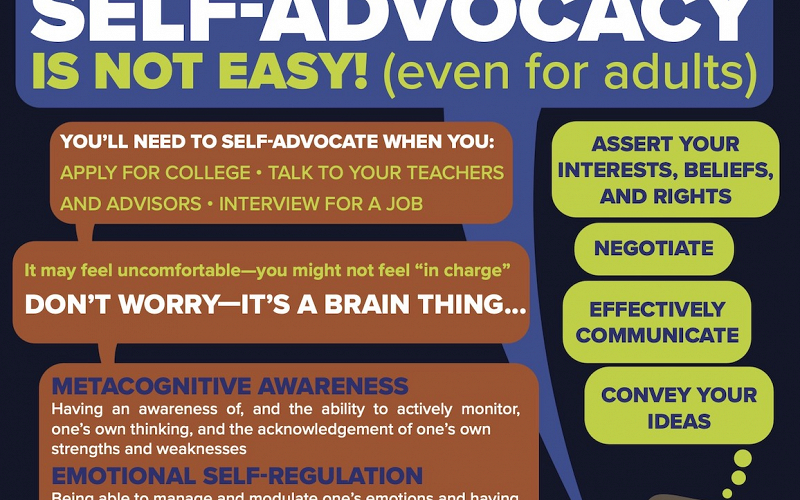Interview on Self-Advocacy

Introduction
Self-Advocacy is one of the critical skills students need as they transition to college and, later, to adult life. Unfortunately, many neurodivergent learners struggle with it, and have little or no guidance to overcome the challenge in advocating for themselves.
In this interview, Landmark College LD and Neurodiversity Ambassador-at-Large Dr. Manju Banerjee explains how parents and educators can spot signs and behaviors of poor self-advocacy, and shares some easy and actionable ways to practice and improve this skill with your learner.
Q. Can you define self-advocacy?
Self-advocacy is the skill or ability to speak up for oneself. It’s the ability to express one’s needs, desires, or interests to someone who is usually a person of authority. And, there’s usually a power differential when speaking up for oneself.
It’s also taking responsibility for what you speak up for. You need to show a commitment and follow through on what you ask for. If you advocate to your parent saying, “I will go and meet with the services office and request accommodations,” then you actually have to go and do it. You can’t, a month later, say you’re failing your tests because you didn’t get the accommodations.
Q. Why can it be a hard skill for students to acquire?
Self-advocacy is difficult because it’s an adult skill. It has to be explicitly taught in situ. It’s not an abstract concept. Giving it a definition and teaching it in the abstract isn’t helpful—it’s best learned in situations where you get the right feedback.
If you speak up and are denied what you’re asking, then keep practicing. Being denied what you’re advocating for is still a positive thing. Parents and educators should give positive feedback in regards to what student is asking. If you have a different position to your student, then explain that. It’s important for us as parents or educators to separate battles from war. We need to give a sense of agency to our student so they can learn from consequences. When you get what you want, sometimes it’s good and sometimes it’s not so good.
Q. Do you have advice for ways parents or education professionals can help?
Self-advocacy has to be fostered. You can’t simply tell your student to go speak to their teacher. Parents have to model it and show that there are advantages to speaking up. And, you must show how to speak up, and when to do so, as well. As adults, we know when it’s not a good time to ask their boss for a raise. Timing is critical. We need to give our neurodivergent learners the vocabulary of how to ask for something. It’s important they use the correct expressive language.
Parents and educators should understand as well that when someone says “no,” our student may go into denial, get emotionally upset, or exhibit displacement behaviors. Our research shows the strategy that works best is reappraisal—to reframe the situation in a way that helps you calm down. It’s conceptual, yes, but you are dealing with the actual consequences. It’s a cognitive behavioral technique.
Q. Are you aware of any resources—webinars, podcasts, articles—on your website that would be appropriate to point families to so they can learn more about self-advocacy?
Yes, I recently created a presentation on self-advocacy, you can find it here.
You can also download our poster on self-advocacy.
Q. As parents and their kids start thinking toward college, what can they do to best prepare for this new chapter?
What I tell parents is to always have a plan B. Plan A is ideal, but there are often glitches and it doesn’t go according to plan. Some of our students fall apart when don’t get into the college of their choice. You can’t fall apart, though, and that’s why it’s good to have a plan B. Sometimes when our students don’t get the grade they want, they fall apart. That is the best time to reappraise the situation. Rethink it, then go back and advocate for yourself and find out what happened.
Also, parents should engage their son or daughter so decisions are co-determined. As parents, we always think we know what’s best for our children. Maybe we do, maybe we don’t. As they are taking first steps into becoming independent individuals, it’s important that parents show them the way—whether it’s about college choice, or their major, or going where their friends go. Help them learn to explore.
What do you think it is most important for parents and educators to know about Landmark College?
An alumni once told me, “Landmark College gave me my smile back.” So, I tell parents to explore, maybe take a second look at Landmark College. Rethink some of your perceptions. Landmark College today is not the same as it was even 5 years ago. We are constantly adding programs that engage, interest, and challenge students and their thinking. We truly mean it when we say, “you learn differently, we teach differently.” Here, it’s about students who are divergent thinkers. We give them opportunities to come into their own.
About Manju Banerjee, Ph.D., Landmark College LD and Neurodiversity Ambassador-at-Large
Dr. Banerjee brings deep experience in the field of learning disabilities, ADHD, autism, and postsecondary disability services to Landmark College. She is a certified diagnostician and teacher-consultant on learning disabilities, and has published and presented extensively—in the U.S. and abroad—on disability documentation and accommodations, technological competencies for postsecondary transition, online learning, and universal design. She has been and is currently the principal investigator or coprincipal investigator on multiple federal, foundational, and NSF grants.
Dr. Banerjee is an editorial board member of the Journal of Postsecondary Education and Disability; LD: A Multi-Disciplinary Journal, Professional Advisory Board member to the Learning Disability Association of America, and a consultant to Educational Testing Service. At present, she also teaches a graduate-level online course on Universal Design: Principles and Practice.
Interview conducted by Carrie Bishop and Rachel Trajan from Intead.com.